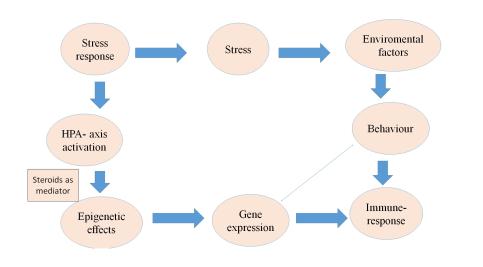General information

Early life stress can provoke deleterious effects on traits such as; behaviour, immune-system response, fecundity and reproduction.Aversive experiences in early life might cause long term effects by programming of the hypothalamic–pituitary–adrenal (HPA) axis which mediates the stress response. As the genome begins shaping in the early stages of life, aversive early experiences might result in modifications in gene expression via epigenetic modifications . Recently, it was shown that the effects that result from exposure to unfavourable conditions early in life, can be transmitted to the offspring
Social isolation represents a potential stressor in birds as it was shown to be accompanied with elevated plasma corticosterone levels. Studying the effects of such a stressor early in life on immune-system response, DNA methylation and behaviours is relevant for understanding the relevance of early life conditions on evolution levels.
What is stress?
“Everybody knows what stress is and nobody knows what it is” quoted by Hans Selye, the father of stress. By this quote he clarified the dilemma that face scientists in agreeing on a specific definition of stress. The problem in defining stress might be due to the fact that stress is often defined from a various respective to each science field (physiology, ethology, etc). Many efforts has been put in defining stress, therefore there are several definitions of stress. In the current experiment, I evaluate the effects of stress from a genetic and physiological perspectives. Therefore, I chose to define stress from a physiological aspect as “a state of activation of the hypothalamo-pituitary-adrenal (HPA) axis in response to a stressor accomplished with high secretion of glucocorticoids (corticosterone).
Social isolation represents a serious stressor as sociality is relevant for many species. Sociality relevance lies in its contribution in facilitating the domestication process. Social isolation was shown to have behavioural and physiological influences on some species such as; rats and cattle.In birds, high levels of plasma corticosterone levels in addition to a decrease in the nutritional factors were detected in response of social isolation.
Epigenetics
Epigenetics can be defined as the study of secondary chemical modifications on the DNA structure. These modifications can occur by DNA methylation or histone modifications which orchestrate gene expression and does not change after cell divisions.
Nowadays, epigenetic refers to the mechanisms through which DNA is expressed and translated. Most focus has been directed to two phenomena: methylation of cytosines in CpG positions and various alternations of histones such as methylation and acetylation.
Early life stress and Epigenetics
prolonged stress was also found to have impacts on epigenetic and gene expression. It was found that stress can alter gene expression by histone modification or DNA methylation which might lead to epigenetic changes.
Shaping of epigenome was shown to begin in a very early stage in life. Therefore, early experiences are believed to play a role in epigenetic modifications. In domestic chickens, it was shown that stress responses take place through genetic and epigenetic mechanisms. The underlying mechanisms through which early stress can alter the epigenome are still not clear. Though, evidence is accumulating that steroid hormones are significant candidates in arbitrating epigenome modifications. Hence, they act as transcription factors that orchestrate the gene activity and can partly regulate the behaviour and physiology.
Stress and Immune-system
Early stress can affect many traits such as; epigenetics, behaviour and immune-system. Early stress was found to cause changes in the immune response of the exposed animals. In rat pups, lack of maternal care resulted in modification in the brain-axis followed by an increase of the immune response in the stressed individuals in comparison to the control ones.In chickens, early experiences can alter immune response in adulthood. The mechanism of how early life stress Can affect the immunity is not well studied yet. However, there are some speculations that suggest that during stressful conditions, hypothalamus activates the HPA-axis which is responsible for elevating the circulating corticosterone levels which could affect the immune system responses.
Cytokines and stress response
Cytokines [e.g Interleukin-6 (IL-6)] are secreted proteins that play a major role in cell recruitment in addition to restrain both acquired and innate immune responses. The importance of cytokines lies in its essential role in regulating the host immune responses against a pathogen.
IL-6 is the strongest mediator of the stress response mechanism. It plays an integral role in activating the secretion of proteins such as; C- reactive protein (CRP) and albumin from liver coupled with participating in HPA-axis activation. This process might occur by a direct interaction between paraventricular nucleus of the hypothalamus and IL-6 receptors. Hence it is responsible for acute-phase.In chickens, IL-6 has been shown to be essential in immune responses especially the pro inflammatory.
Aims of my study
1- investigate short- and long term effects of early life stress on chicken physiology, epigenetic patterns and behaviour.
2- comparing with the untreated control group and the enrichment group.
3- shedding a light on DNA methylation changes that might occur in different types of cells (blood and sperms) as a result of exposure to stress early in life.
4- inquiring the immune-response to stress by measuring cytokines (Interluekin-6) levels in plasma in comparison with the control and enrichment group in young and old birds.
Responsible for this page:
Director of undergraduate studies Biology
Last updated:
05/30/17
